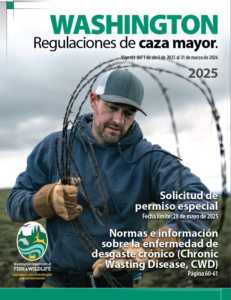Washington › Hunting › Tribal Hunting
-
General Info
- Hunting Hours
- Hunting Access & Closures
- Hunter & Trapper Education
- Hunting Access on Private Lands
- Where To Get Maps
- DNR Lands
- Definitions
- Chronic Wasting Disease (CWD)
- Turn in a Poacher (TIP) Program
- State Recreation Lands & Water Access Sites
- Treponeme-Associated Hoof Disease (TAHD) in Elk
- Washington Department of Fish & Wildlife
- Licenses, Permits & Fees
-
Hunting Regulations
- Deer General Information
- Elk General Information
- Black Bear
- Equipment & Hunting Methods
- Mandatory Hunter Reporting
- Violations & Penalties
- Prohibited Hunting Methods
- Tagging & Transporting Game
- Persons with Disabilities
- Tribal Hunting
- Public Conduct Rules on WDFW Lands
- Hunter’s Code of Conduct
- Antler Point Diagrams
- Baiting for the Purposes of Hunting Deer or Elk
- Species Identification
- WDFW Check Stations
- Seasons & Limits
- Management Areas
- Maps
- Turkey Hunting
- Special Permits
- PDF Downloads
Tribal Hunting
Tribal Hunting has been occurring here in the Pacific Northwest for millennia. As a historic way of life, the indigenous people in Washington State have hunted, fished, and gathered natural resources, traditional foods, and medicinal plants since time immemorial.
In 1854-55, Long before statehood, territorial Governor Isaac Stevens (commissioned by the United States) negotiated several treaties with the tribes in what is now Washington State to obtain the land to accommodate the wave of oncoming homesteaders. These were the treaties of Medicine Creek, Neah Bay, Olympia, Point Elliott, Point No Point, Wala Wala, Yakama, and Nez Perce Nations.
The United States government negotiated the Stevens treaties with the tribal nations for the peaceful settlement of the territory. Tribes were rightfully engaged at a Nation-to-Nation level. The treaties established reservations for the exclusive use of the tribes. In addition, the treaty tribes kept their inherent right to hunt, fish, and gather on traditional lands off the reservations.
The Stevens treaties contain language reserving the right to hunt, fish, and conduct other traditional activities on lands off of the reservations:
“The right of taking fish, at all usual accustomed grounds and stations, is further secured to said Indians in common with the citizens of the territory…together with the privilege of hunting…on open and unclaimed lands.”
U.S. Constitution recognizes treaties as formal contracts between nations and thus the supreme law of the land (Supremacy Clause Article VI, paragraph 2).
Today tribal governments manage and regulate hunting for their enrolled tribal members to exercise rights reserved in the 1850s and those rights continue today.
Twenty-four tribes have off-reservation hunting rights within Washington State. However, some tribes in Washington do not have treaties or rights to hunt off their reservations. Instead, both tribal and state-licensed hunters hunt game animals across the state. The Washington Department of Fish and Wildlife and tribal governments must work together to manage wildlife while accounting for differences in cultural heritages and legal frameworks, such as tribal ceremonial and subsistence hunting and state recreational hunting.
Many tribal governments take an active role in the management of wildlife resources. Most tribes with off-reservation hunting rights develop their regulations and management strategies. In recent years, WDFW and various tribes have worked together to develop management plans for wildlife populations and to rebuild game populations. For more information about tribal hunting, visit the WDFW tribal hunting page.
Acknowledging the Indigenous People, Land & Culture of the Pacific Northwest
Since time immemorial, Indigenous People have lived in the Pacific Northwest and hunted, fished, and gathered natural resources, traditional foods, and medicinal plants to support their diverse cultures. They were the original occupants and stewards of this land that all Washingtonians enjoy today.
The very survival of the Pacific Northwest Tribes is a testament of resiliency of what they have endured and continue to endure throughout generations on this landscape. Through many historical encounters of massacre, renunciation of religious freedom, systemic racism, cultural assimilation of native children through institutional residential schools, and the fight for their inherent rights and liberties, they have prevailed. Throughout this painful history brought by colonization, abrogated treaties, infringement of civil rights, and the salmon protests of the 1960s, the Northwest Tribes and the Washington Department of Fish and Wildlife (WDFW) have founded a commitment of respect, unity, and alliance informed by the realities of the past.
Today, tribal governments and WDFW work collaboratively to conserve and manage aquatic and terrestrial resources statewide and practice sound science to guide management decisions. The Tribes and WDFW work together to ensure the sustainability of fish, wildlife, ecosystems, and culture for the next seven generations and beyond.


